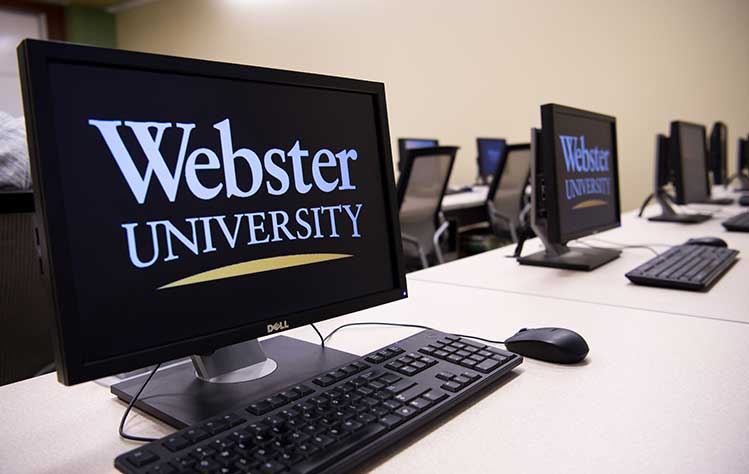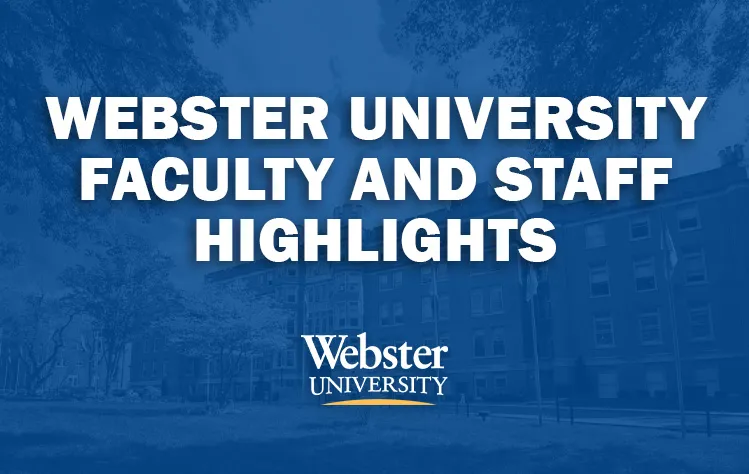A Foundation for Success
At Webster, your education is not confined to the classroom – it’s an immersive, dynamic journey that prepares you for success in an interconnected world.
GCP courses focus on helping you make connections between all of your classes so that
you are comfortable thinking and speaking about big issues. Because it was designed
with employers across the St. Louis area, it builds skills that are in high demand
when students leave college, including strong written and oral communication, critical
thinking skills, intercultural understanding and ethical reasoning. GCP classes are
also fun!
Keystone Seminars: Hands-On Learning for Real-World Impact
Imagine diving into real-world challenges that matter — exploring the global water crisis, tackling modern slavery, designing sustainable solutions or advocating for human rights. Keystone Seminars at Webster University take you beyond textbooks and lectures, giving you hands-on experiences that make a real impact. Whether you're testing water samples, engaging with local organizations fighting human trafficking, or designing a community project, these courses let you step into the world as a problem-solver, critical thinker and changemaker. It’s learning that goes beyond the classroom — because the world needs your ideas and action.
Transformative Learning Experiences

Webster students team up with collaborators at Missouri Botanical Garden to uncover the hidden world of insects through DNA barcoding

Webster art students cast their designs using 3,000-degree molten iron, transforming raw materials into sculptures. The hands-on project gave students experience with advanced techniques.

Webster University’s School of Communications and School of Education, along with Nine PBS, collaborated on and produced a new season of the locally produced “Teaching in Room 9.”

International Distinction Award

Students who complete their undergraduate requirements and satisfy three core components of international education earn our University’s prestigious International Distinction award. We annotate your diploma and transcript with the International Distinction, which reflects significant and practical international field experience in a country other than your own.
Program Details
The mission of the Global Citizenship Program (GCP) is to ensure that every undergraduate student emerges from our University with the core competencies required for responsible global citizenship in the 21st century.
These competencies include both knowledge and skills, as reflected in the GCP learning outcomes. Responsible global citizenship requires knowledge of the world, its physical and natural aspects, how humans and their social institutions work, how humans derive meaning and express themselves artistically, how forces pull people of the world together or push us apart and how to support arguments with quantitative data.
To be an effective member of a workplace, community, organization, neighborhood or household in the 21st century, we need to develop critical skills. These abilities create a strong foundation for life and developing them gives us the tools for creative and critical thinking, oral and written communication, quantitative literacy, intercultural competency, the ability to assess, apply and evaluate ethical values and perspectives, connect academic and life experience, apply past learning to new situations and the ability to collaborate as a member of a team.
To complete the Global Citizenship Program, students will take two seminars, the First-Year Seminar as new students and the Global Keystone Seminar as Juniors. In addition, students will complete eight courses of at least three credit hours each in the general education portion of the program.
Global Citizenship Program:
If your requirements fall under the Global Citizenship Program, you will complete 30 credit hours.
Degree Requirements — 6 credit hours
- FRSH 1200 First-Year Seminar: 3 credit hours (Required for all students; see below for substitute courses for transfer students.)
- Global Citizenship Program Keystone Seminar: 3 credit hours (Required for all students.)
General Course Requirements: 24 credit hours of knowledge/skills courses. Each GCP course is coded for a knowledge area and a skill. You need:
Knowledge Areas — 24 credit hours
- 6 credit hours from courses with two different prefixes designated Roots of Cultures.
- 6 credit hours from courses with two different prefixes designated Social Systems and Human Behavior.
- 3 credit hours from courses designated Physical and Natural World.
- 3 credit hours from courses designated Global Understanding.
- 3 credit hours from courses designated Arts Appreciation.
- 3 credit hours from courses designated for Quantitative Literacy.
Skills Requirements
All students must complete three credit hours in courses coded for each of the following skills:
- Written communication
- Oral communication
- Critical thinking
- Intercultural competence
- Ethical reasoning
Students will usually complete the skills requirement with courses in the GCP course requirements but may also complete it with appropriately coded courses within their major, or within other coded courses not part of the GCP.
Students who successfully complete the program will be able to:
- Demonstrate knowledge of human cultures and the sources of meaning (Roots of Cultures).
- Demonstrate knowledge of human cultures and how people and their cultures and institutions work (Social Systems and Human Behavior).
- Demonstrate knowledge of the physical and natural world (Physical and Natural World).
- Demonstrate knowledge of cultures foreign to them, international languages or the forces that draw people of the world together and forces that push them apart (Global Understanding).
- Demonstrate knowledge of human artistic expression (Arts Appreciation).
- Demonstrate an understanding of and create arguments supported by quantitative evidence and clearly communicate those arguments in a variety of formats (Quantitative Literacy).
- Recognize when there is a need for information and identify, locate, evaluate and responsibly use and share information relevant for the problem at hand.
- Explore ideas, issues, images and events comprehensively by analyzing and evaluating assumptions and arguments, constructing well-supported arguments and developing innovative plans or ideas to solve problems.
- Assess their own ethical values and, in the social context of problems, apply and evaluate ethical perspectives and concepts.
- Demonstrate understanding of the complexity of elements important to members of another culture in relation to history, values, politics, communication styles, economy or beliefs and practices.
- Communicate ideas, opinions and information effectively by preparing and delivering purposeful oral presentations designed to increase knowledge, to foster understanding or to promote change in listeners' attitudes.
- Use language effectively to communicate in a variety of written genres.
- Demonstrate — through effective use of genre, context and syntax — understanding of the purpose of their writing and appropriate approach to a particular audience.
- Make connections between academic learning and life experiences across disciplines and perspectives.
- Apply knowledge, skills and responsibilities to new settings and complex problems.
- Demonstrate the ability to work constructively as part of a team by contributing directly, facilitating others' contributions, fostering a constructive climate, and responding well to conflict.
First-Year seminar is required for all new full-time degree-seeking Freshmen (who have not previously matriculated at another post-secondary institution or who have fewer than 16 credit hours of college credit and are also younger than 20 years old).
It is only open to students who are newly matriculated to Webster University. At the campus in Webster Groves, Missouri, it is offered only in the Fall semester (some international campuses also offer it in the Spring).
As part of the Global Citizenship Program, completing First-Year Seminar is an undergraduate degree requirement. Students who earn a grade lower than "C-" must fulfill the requirement with an approved substitute course that addresses interdisciplinary and integrative learning.
Similarly, students who transfer to Webster University meet the requirement by completing three credit hours from a list of approved substitute courses. See the list at the top of the GCP Degree Audit in Connections or contact an academic advisor for more information.
Q: Can I use courses from my major in the GCP?
A: No, courses from the major will not count to fulfill GCP requirements, except for double majors.
Q: If I double major, how many courses can I use toward GCP from each major?
A: No courses used to fulfill the course requirements of a student's first major may be used to satisfy Global Citizenship Program course requirements.
Courses in a second major or in a minor or certificate program may be used to satisfy Global Citizenship Program requirements. Special accommodations are made adjusting this requirement for a small number of majors with high credit-hour requirements, as indicated in the description of the specific major.
Q: I transferred after my first semester, and FRSH 1200 is only for first-semester students. What do I do?
A: Several Webster courses have been available as substitutes for the First-Year Seminar requirement. Like FRSH 1200, each of these emphasizes integrative learning (making interdisciplinary connections and connections between life experiences and academic knowledge).
Non-traditional students and transfer students without an AA need a substitute course for FRSH 1200 chosen from the following: HRTS 1100*, MUSC 1051, MUSC 1052, PHIL 1010*, PHIL 1200, PHIL 2320*, POLT 1550, SCIN 1030*, SOCI 2375*, SPCM 1040 or SUST 1100. FYS substitute courses may not also fulfill a Knowledge or Skill.
In addition, a limited number of courses at other colleges have been identified as FRSH 1200 substitutes. These include the IDS "Cornerstone" courses in the St. Louis Community College system and transfer courses equivalent to the Webster courses listed here with an asterisk (*).
In and Around Webster University
Webster’s Nursing Program Named Among the Best for the Fourth Consecutive Year
April 8, 2025
Webster University’s Master of Science in Nursing (MSN) program was named one of the top graduate nursing programs...

Webster University Launches a Master’s in Computer Science with Artificial Intelligence Program
March 18, 2025

Faculty and Staff Highlights: Assner-Alvey, Belo, Holzen, Muyco-Tobin, Pease, Smith
March 11, 2025

